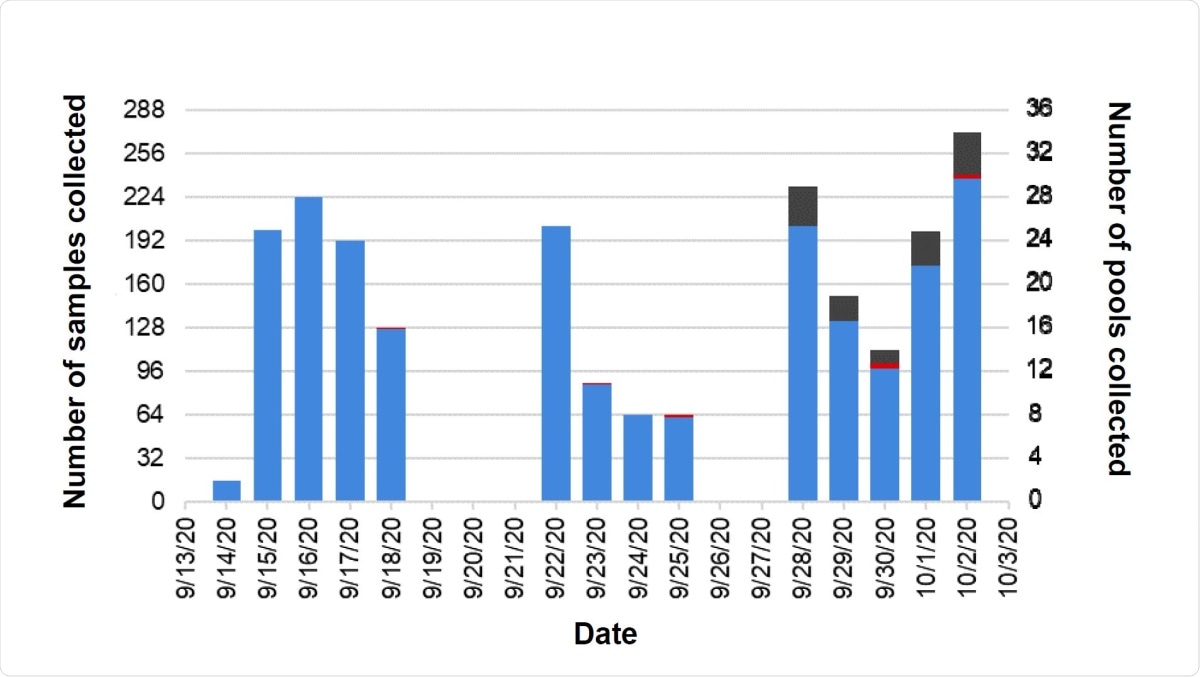During the coronavirus disease 2019 (COVID-19) pandemic, caused by the severe acute respiratory syndrome coronavirus 2 (SARS-CoV-2), many countries closed schools to contain the virus's spread.
After the peak of the pandemic’s first wave, schools in most countries had re-opened. However, some people fear that schools could fuel outbreaks if COVID-19 cases are not detected early.
Testing is one way to detect those who are infected with SARS-CoV-2. Yet, testing everyone in the school regularly may be tedious and expensive.
A team of researchers at Tufts University, USA, has found that pool testing in schools and universities can identify COVID-19 patients. This way, schools can immediately report the case, refer the staff to health departments, and conduct contact tracing.
During the pandemic, efficient testing, isolation of cases, and contact tracing are useful measures to prevent outbreaks.

 This news article was a review of a preliminary scientific report that had not undergone peer-review at the time of publication. Since its initial publication, the scientific report has now been peer reviewed and accepted for publication in a Scientific Journal. Links to the preliminary and peer-reviewed reports are available in the Sources section at the bottom of this article. View Sources
This news article was a review of a preliminary scientific report that had not undergone peer-review at the time of publication. Since its initial publication, the scientific report has now been peer reviewed and accepted for publication in a Scientific Journal. Links to the preliminary and peer-reviewed reports are available in the Sources section at the bottom of this article. View Sources
Pool testing
Early in the pandemic, many countries struggled with test kits. Due to the novel coronavirus, it took months before each country developed its testing kits.
Health experts said that pooling samples could help compensate for the lack of testing kits. Pooling samples involves mixing several samples in a batch or pooled sample. These samples are then tested with a diagnostic test to upsurge the number of people that can be tested using the same number of resources.
The repeated testing of a population is essential to mitigate the spread of the SARS-CoV-2 and for the safe reopening of educational institutions, such as K-12 schools and colleges.
Most screenings use the Center for Disease Control and Prevention (CDC) Reverse transcription-polymerase chain reaction (RT-PCR)-based assay. Individual testing can be time consuming and expensive. Pooling samples from many people into a single test is a good alternative that promises significant cost savings.
The study
The study, published on the pre-print medRxiv* server, highlights the use of pooled testing in schools to reduce the cost of individual and regular testing. This can also help in upcoming school re-openings.
The researchers conducted a pilot study to assess the feasibility and efficiency of analyzing samples in pools of eight by the RT-PCR assay to arrive at the study findings.
The team recruited a total of 1,576 participants in Tufts University who were undergoing regular screening. Each of the participants provided two swabs, one analyzed separately while the other in a pool of eight.

Pooled Pilot Study Timeline. Two thousand and thirty-two pairs of samples were collected over a three-week period. Two thousand and twenty-one of those pairs were collected from the Tufts University community (blue). The other 11 pairs were collected from individuals under investigation and in quarantine due to possible exposure to SARS-CoV-2 (red). During the third week of the study, the low positivity rate in the Tufts community necessitated the inclusion of laboratory-generated positive samples (grey).
The study results showed that pooled tests had 100% correspondence with those of their respective individual tests. This indicates no loss of sensitivity when doing the SARS-CoV-2 screening from pools of eight compared to individual analyses.
The team concluded that schools and colleges can use pooled testing to cut the cost of individual testing. It can also provide results faster, making school reopening safe. It can also help reduce the risk of contracting the virus in schools.
Maintaining in-person community activities such as K-12 school attendance during the COVID-19 pandemic will rely on early identification and containment of infectious individuals,” the researchers explained.
“The pooling method we present here is a simple, scalable way to reduce the cost of regular surveillance screening for such groups,” they added.
COVID-19 global toll
The coronavirus pandemic continues to threaten many countries across the globe. It has spread to 191 countries and regions.
Many countries report surging COVID-19 cases. The United States has over 17.73 million cases and more than 317,000 deaths. Following are India, with over 10 million cases, Brazil, with around 7.21 million cases, and Russia, with more than 2.81 million cases.

 This news article was a review of a preliminary scientific report that had not undergone peer-review at the time of publication. Since its initial publication, the scientific report has now been peer reviewed and accepted for publication in a Scientific Journal. Links to the preliminary and peer-reviewed reports are available in the Sources section at the bottom of this article. View Sources
This news article was a review of a preliminary scientific report that had not undergone peer-review at the time of publication. Since its initial publication, the scientific report has now been peer reviewed and accepted for publication in a Scientific Journal. Links to the preliminary and peer-reviewed reports are available in the Sources section at the bottom of this article. View Sources
Source:
Journal references:
- Preliminary scientific report.
Simas, A., Crott, J., Sedore, C., Rohrbach, A., et al. (2020). Pooling for SARS-CoV2 Surveillance: Validation and Strategy for Implementation in K-12 Schools. medRxiv. doi: https://doi.org/10.1101/2020.12.16.20248353, https://www.medrxiv.org/content/10.1101/2020.12.16.20248353v1
- Peer reviewed and published scientific report.
Simas, Alexandra M., Jimmy W. Crott, Chris Sedore, Augusta Rohrbach, Anthony P. Monaco, Stacey B. Gabriel, Niall Lennon, Brendan Blumenstiel, and Caroline A. Genco. 2021. “Pooling for SARS-CoV2 Surveillance: Validation and Strategy for Implementation in K-12 Schools.” Frontiers in Public Health 9 (December). https://doi.org/10.3389/fpubh.2021.789402. https://www.frontiersin.org/articles/10.3389/fpubh.2021.789402/full.